Experience Time
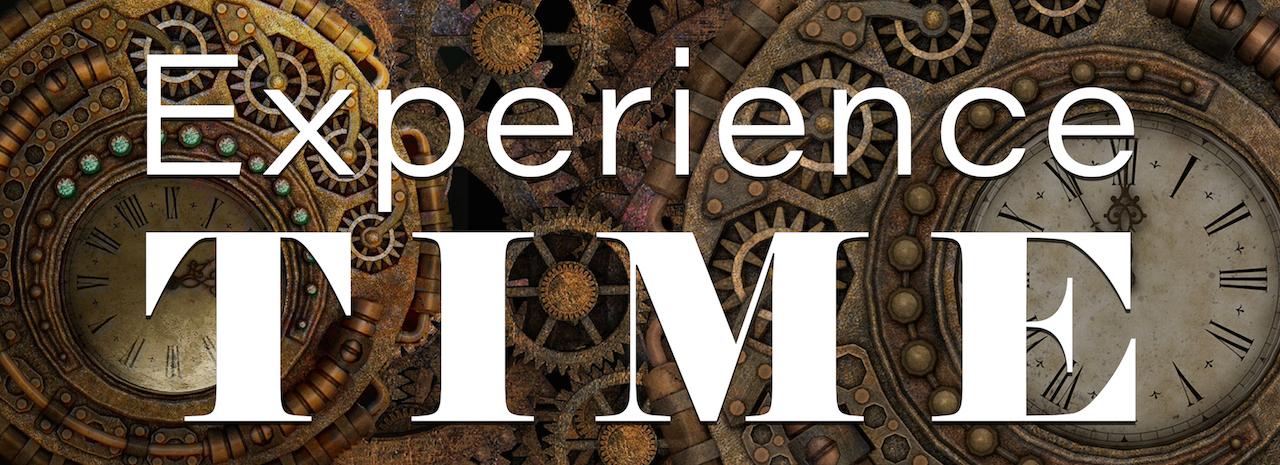
The Common Experience (CE) grant funded projects for the 2018-19 theme of "Experience Time" are listed below. They are led by faculty and/or staff that applied for grants in February 2018.
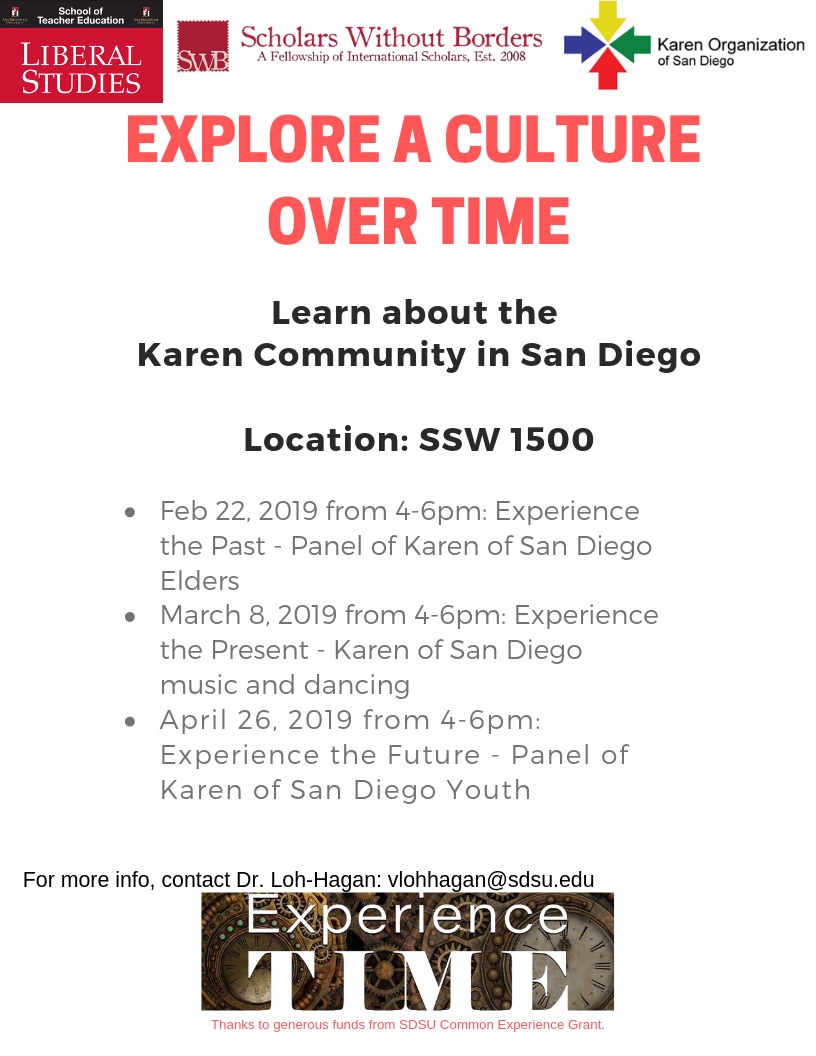
Event: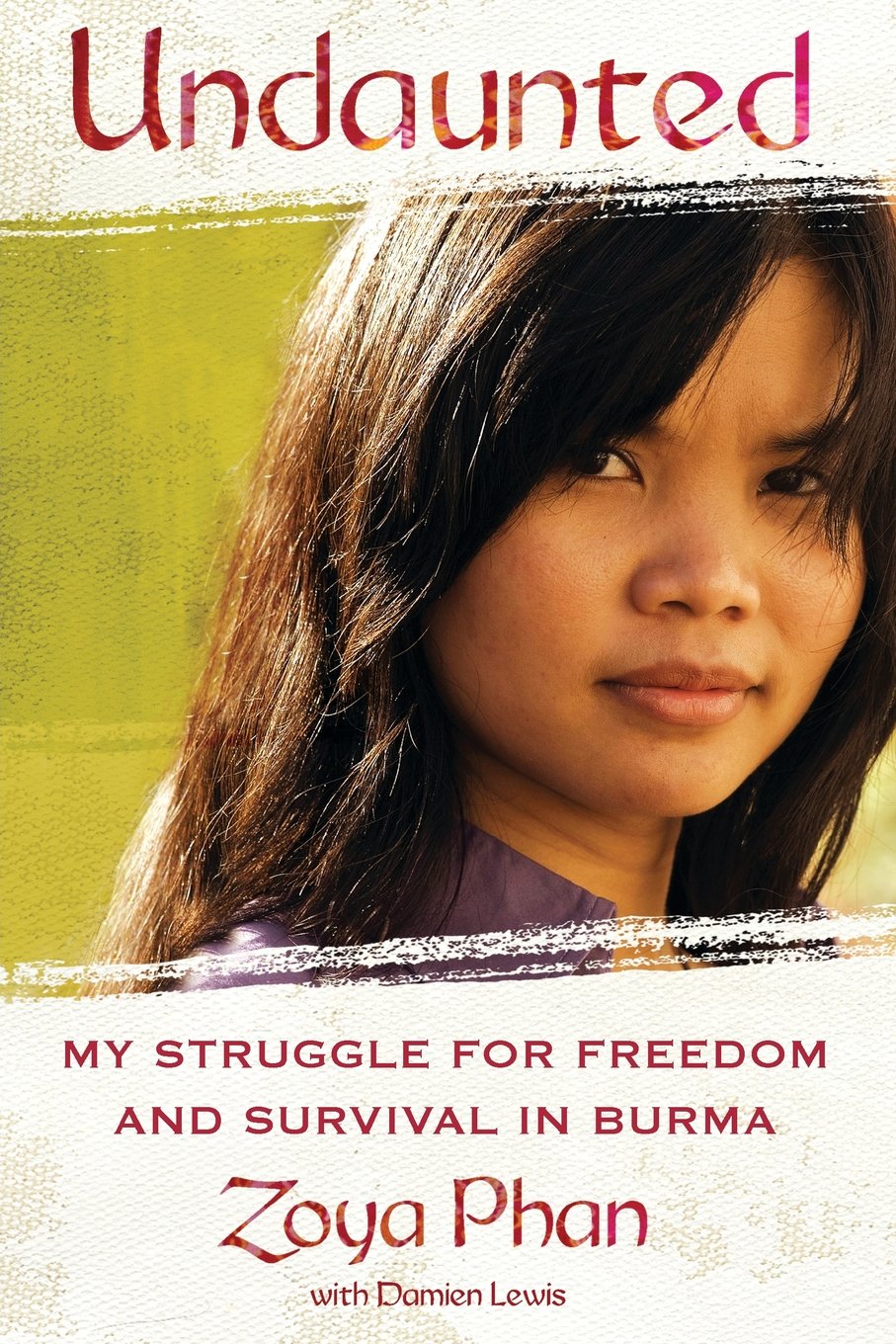
SDSU Organizations Involved: Aztecs for Education, "Scholars Without Borders" soon
to be Phi Beta Delta
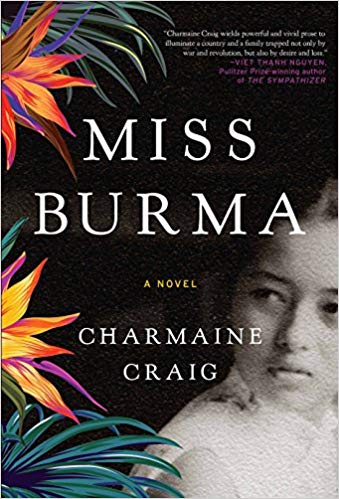 Fall 2018:
Fall 2018:
During the Fall 2018, the Liberal Studies program, Aztecs for Education, and "Scholars Without Borders" would like to host common reading experiences around MISS BURMA by Charmaine Craig, UNDAUNTED by Zoya Phan, and/or BAMBOO PEOPLE by Mitali Perkins. Participants are encouraged to read at least one of the three books or all three books. There will be book club meetings and panel discussions around the common themes presented in the books.
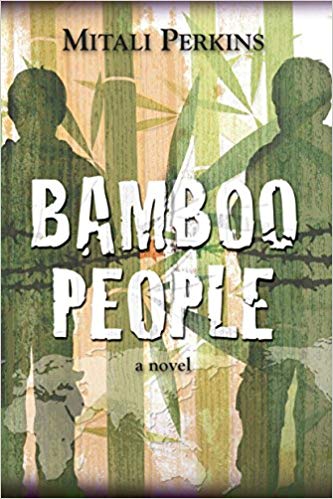 Spring 2019:
Spring 2019:
Building on knowledge gained from the common reading experiences, the Liberal Studies program, Aztecs for Education, and "Scholars Without Borders" will support various events to learn more about the Karen people living in San Diego.
Faculty Sponsor:
Virginia Loh-Hagan, School of Teacher Education, [email protected]
Event:
A Transgenerational Perspective on the Intellectual and Political Legacies of Early
Chicana Feminism
Location: Love Library 430
Date: April 25, 2019
Time: 9:30AM-10:45AM
Professor Dionne Espinoza (CSULA) and Professor Maylei Blackwell (UCLA), editors of Chicana Movidas. New Narratives of Activism and Feminism in the Movement Era (UT Press, 2018) will be speaking along with Chicana pioneers Anna Nieto Gomez, Teresa Oyos, Martha Salinas, and others.
John McKiernan-Gonzalez
Location: Love Library 406
Date: May 2, 2019
Time: 9:30AM-10:45AM
Medical borders and American borderlands: Transnational infrastructures and public health policy in 20th century America
Recent work on Texas has pointed out how connected the Texas economy is to the rest of the world, whether through NAFTA, oil exports, the auto industry or people’s families. State medical policies, however, have struggled to incorporate these connections into nation-based reforms. Moreover, the current public health crisis at the border stems from issues that had currency in 1848, 1882, 1898 and 1917, in particular the disconnect between what people consider to be representative national identities and the far messier ongoing movement of peoples, goods, and ideas that move across state borders. This presentation will point out the ways medical policies and anxieties have been integral to the story of Jim Crow, Civil Rights, and Migrant Policing.
Bio: John Mckiernan-Gonzalez is the Director of the Center for the Study of the Southwest, the Jerome and Catherine Supple Professor of Southwestern Studies, and an Associate Professor of History at Texas State University. He is a 1991 MMUF graduate from Oberlin College, and a 2002 graduate of the program in history at the University of Michigan. His first book, Fevered Measures: Public Health and Race at the Texas-Mexico Border, 1848-1942 (Duke, 2012), treats the multi-ethnic making of a U.S. medical border in the Mexico-Texas borderlands. He co-edited the volume, Precarious Prescriptions: Contested Histories of Race and Health in North America (University of Minnesota, 2013) which examines the contradictions and complexities tying medical history and communities of color together. His broad takes on Latina/os in U.S. medical history can be found in the OAH and National Park Service collaborative, American Latinos in the Making of the United States and in Keywords in Latina/o Studies (NYU, 2017). He has worked with the Smithsonian Institution, the Kellogg Foundation, the Nettie Lee Benson Library and AMSA on a variety of collaborative public history projects. His next project, Working Conditions: Medical Authority and Latino Civil Rights tracks the changing place of medicine in Latina/o/x struggles for equality. Born in the U.S., he grew up in Colombia, Mexico, and the U.S. South and brings a migrant eye and experience to his projects in public history, medical history, and Latino studies.
Faculty Sponsor:
Victoria Gonzalez-Rivera, Department of Chicana and Chicano Studies, [email protected]
Event:
Envisioning a Sustainable Future addresses the Common Experience theme of Experience Time by encouraging students of various disciplines to brainstorm, visualize, and convey where they want to see society through a sustainability lens. We would look at various scales, including SDSU, the City, region, country, and beyond. We are engaging with courses to develop deliverables based on discipline and type of course. We are also looking to student organizations to participate in their own way. The program culminates with an event highlighting the work of students across campus, along with displaying student work on the Sustainable SDSU website. The hope is to have a positive focus on visions and solutions for the great challenges we face.
Location: Montezuma Hall
Date: May 1, 2019
Time: 12:30 to 2:00 P.M. ----- Please note we have moved start time to 12:30 in observance
of campus vigil
Faculty Sponsor:
Tom Abram, Facility Services, [email protected]
Jose Preciado, Common Experience, [email protected]
Mark Wheeler, Philosophy, [email protected]
Event:
This talk will present research on the theory, measurement, and application of time perspective. Time perspective refers to individuals’ thoughts and feelings about the past, present, and future and is theorized to be a cognitive-motivational construct that underlies human behavior. A new multidimensional model and corresponding measures will be described. Findings from a series of studies with adolescents and young adults show that time perspective predicts a host of health outcomes including substance use, academic achievement, and psychological well-being. Implications for intervention will also be discussed.
Zena R. Mello (Ph.D., 2005, The Pennsylvania State University) is an associate professor in the Psychology Department at San Francisco State University. Dr. Mello's research examines psychological factors that facilitate the health and well-being of racial or ethnic minority and low-income adolescents. She uses interdisciplinary perspectives and mixed-methods approaches to examine time perspectives and topics specific to minority groups including discrimination and stereotype threat. Her research has been funded by the National Science Foundation, the Institute for Education Sciences, and the American Educational Research Association.
Location: Life Sciences South 246
Date: May 8, 2019
Time: 4:00-5:30 P.M.
Faculty Sponsor:
Lourdes S. Martinez, Associate Professor, School of Communication, [email protected]
Exhibition Dates:
February 9 – April 7, 2019
SDSU Downtown Gallery
725 W. Broadway
San Diego, CA 92101
619-501-6370
Faculty Sponsors:
Bridget Gilman, Assistant Professor, Art History, School of Art + Design, [email protected]
Chantel Paul, Director, SDSU Downtown Gallery, School of Art + Design, [email protected]
Description:
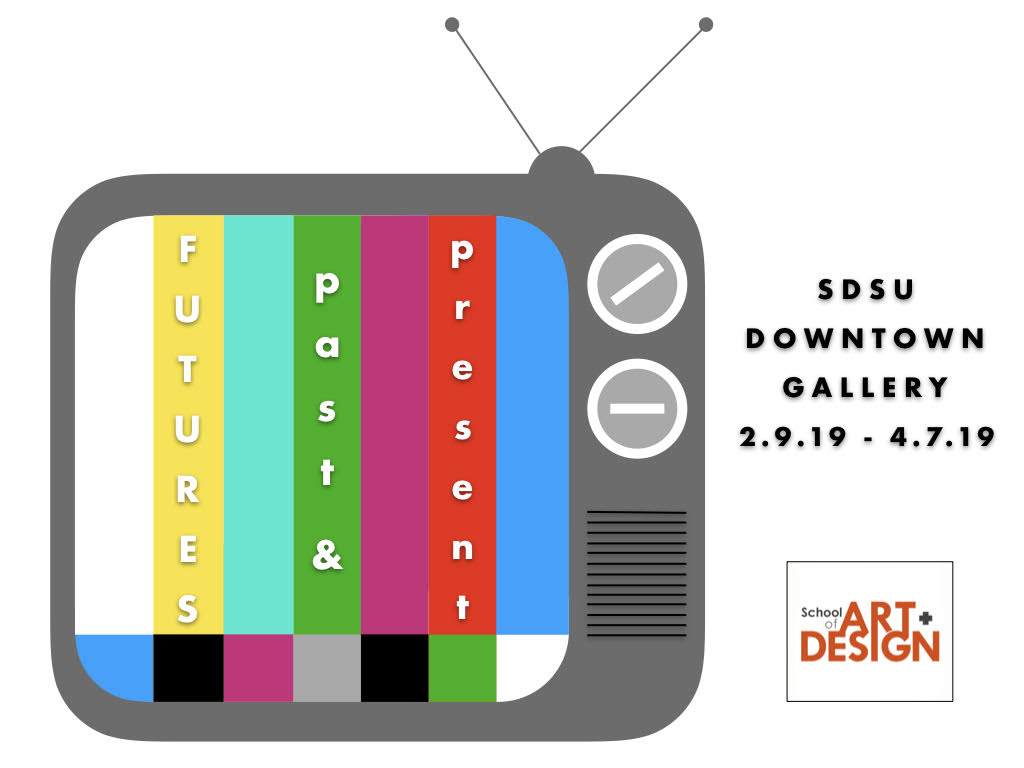 Futures Past and Present is a juried exhibition of student and faculty artwork from the School of Art + Design,
exploring the concept of time by looking to the future. On display at the SDSU Downtown
Gallery, located in the Core-Columbia neighborhood of downtown San Diego, the exhibition
will reach a diverse, inclusive audience from both the university and the surrounding
community.
Futures Past and Present is a juried exhibition of student and faculty artwork from the School of Art + Design,
exploring the concept of time by looking to the future. On display at the SDSU Downtown
Gallery, located in the Core-Columbia neighborhood of downtown San Diego, the exhibition
will reach a diverse, inclusive audience from both the university and the surrounding
community.
Futures Past and Present will present a multidisciplinary, innovative view of the future as imagined by artists from the School of Art + Design. Artistic visions of the future range from the utopian to the dystopian, the mundane to the sublime. Additionally, they offer a pivotal space of inventive possibilities and the practical chance to rehearse potential scenarios. Reflections on the future express contemporary hopes and fears, and thus not only articulate plans for what is yet to come, but also reveal a crucial sense of what needs to change in the present. The Futures Past and Present exhibition will facilitate conversations on pressing issues of environmental, social, and political concern, and encourage critical reflection on how previous generations have envisioned the future, what futures we currently foresee, and what futures we hope subsequent generations may embrace.
Lecture by Colin Marshall:
“Seeing the Future”
February 2019 (Room/Date/Time TBD)
SDSU Campus
Colin Marshall is a film and urban historian who has written extensively on cinema and urban culture. He is invited to campus to speak on how the history of "future cities" have been depicted in film and how these fantastical spaces relate to Southern California. Marshall splits his time between Seoul, South Korea and Los Angeles, California.
To learn more about Colin Marshall and his writings, visit: http://blog.colinmarshall.org/
Opening Reception with the Artists/Downtown at Sundown:
Thursday, February 21, 2019
5:00 p.m. – 8:00 p.m.
SDSU Downtown Gallery
725 W. Broadway
San Diego, CA 92101
619-501-6370
For this Downtown at Sundown join us to celebrate the opening of Futures Past and Present. Meet the artists and mingle as you view the exhibition, featuring artworks from students and faculty of the School of Art + Design, interpreting the theme of “time.”
Downtown at Sundown is in partnership with the Museum of Contemporary Art (MCASD), Stone Brewing Co., Aaharn, and Carnivore, on the third Thursday of every month from 5:00 to 8:00
Downtown at Sundown:
Thursday, March 21, 2019
5:00 p.m. – 8:00 p.m.
SDSU Downtown Gallery
725 W. Broadway
San Diego, CA 92101
619-501-6370
Visual and performing arts converge at MCASD’s after-hours offering: Downtown at Sundown. On the third Thursday of every month, enjoy free Museum admission and exhibition tours, DJ-spun tunes, free entry at SDSU Downtown Gallery, drink specials at the adjacent Stone Brewing Company Store, and so much more.
Downtown at Sundown is in partnership with the Museum of Contemporary Art (MCASD), Stone Brewing Co., Aaharn, and Carnivore, on the third Thursday of every month from 5:00 to 8:00 p.m.
“Designing the Future”
Arts Technology Workshop at the “FLab” with Professor Adam Manley
Spring 2019 (Date/Time TBD)
School of Art and Design, Room 415
School of Art + Design students will be invited to see the Flab for an arts technology demonstration by Adam Manley, Assistant Professor, Furniture and Woodworking.
The FLab is a space for collaborative exploration in digital technologies for students, faculty, and staff in the School of Art + Design. It is a designated interdisciplinary zone for engaging with the tools of digital fabrication in pursuit of a wide range of creative endeavors. https://art.sdsu.edu/art-design-flab/
Event:
Location: Hepner Hall 314
Date: March 7, 2019
Time: 3:00-4:30PM
Faculty Sponsors:
Amira Jarmakani, Department of Women's Studies, [email protected]
Irene Lara, Department of Women's Studies, [email protected]
Guest Speakers:
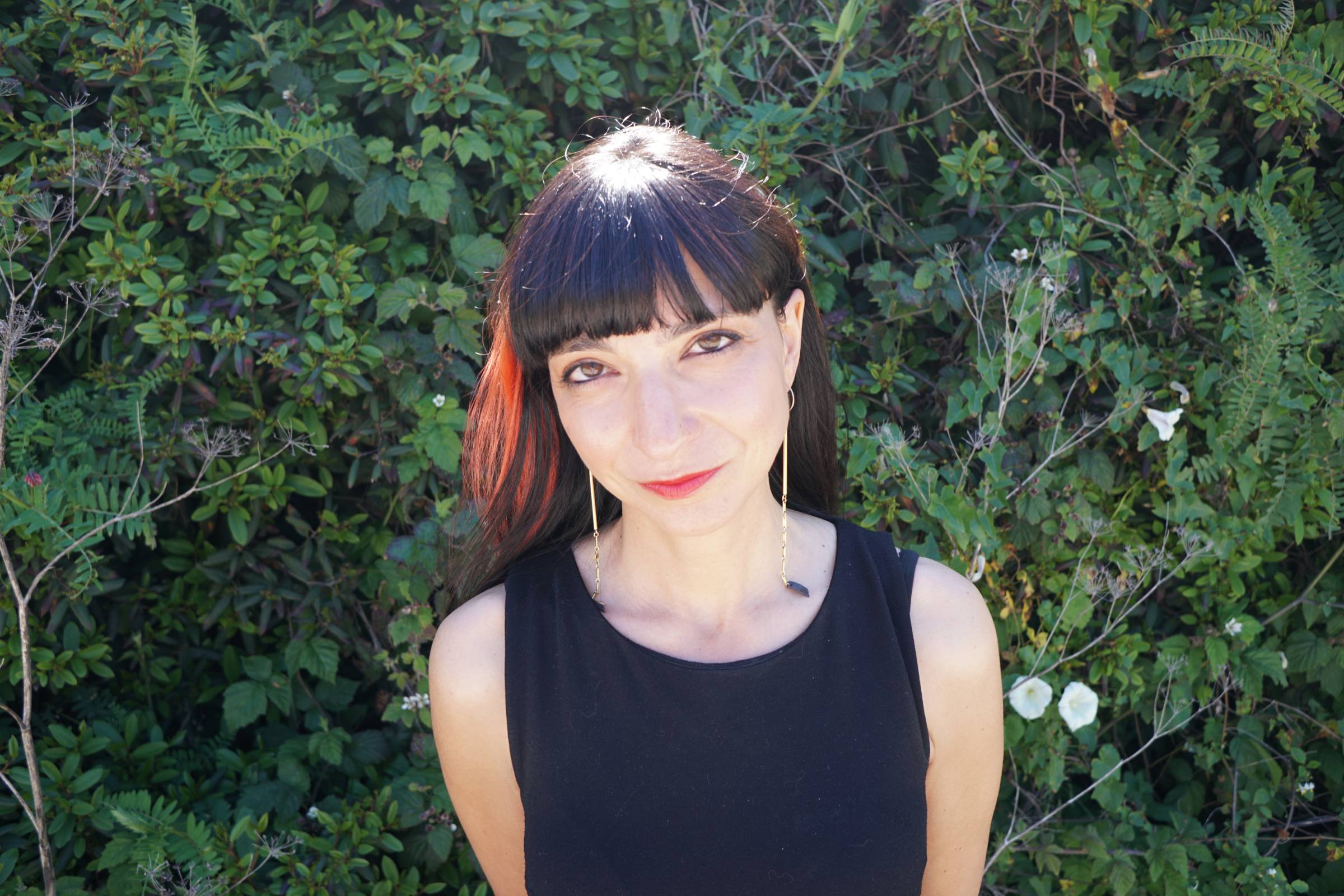 Neda Atanasoski
Neda Atanasoski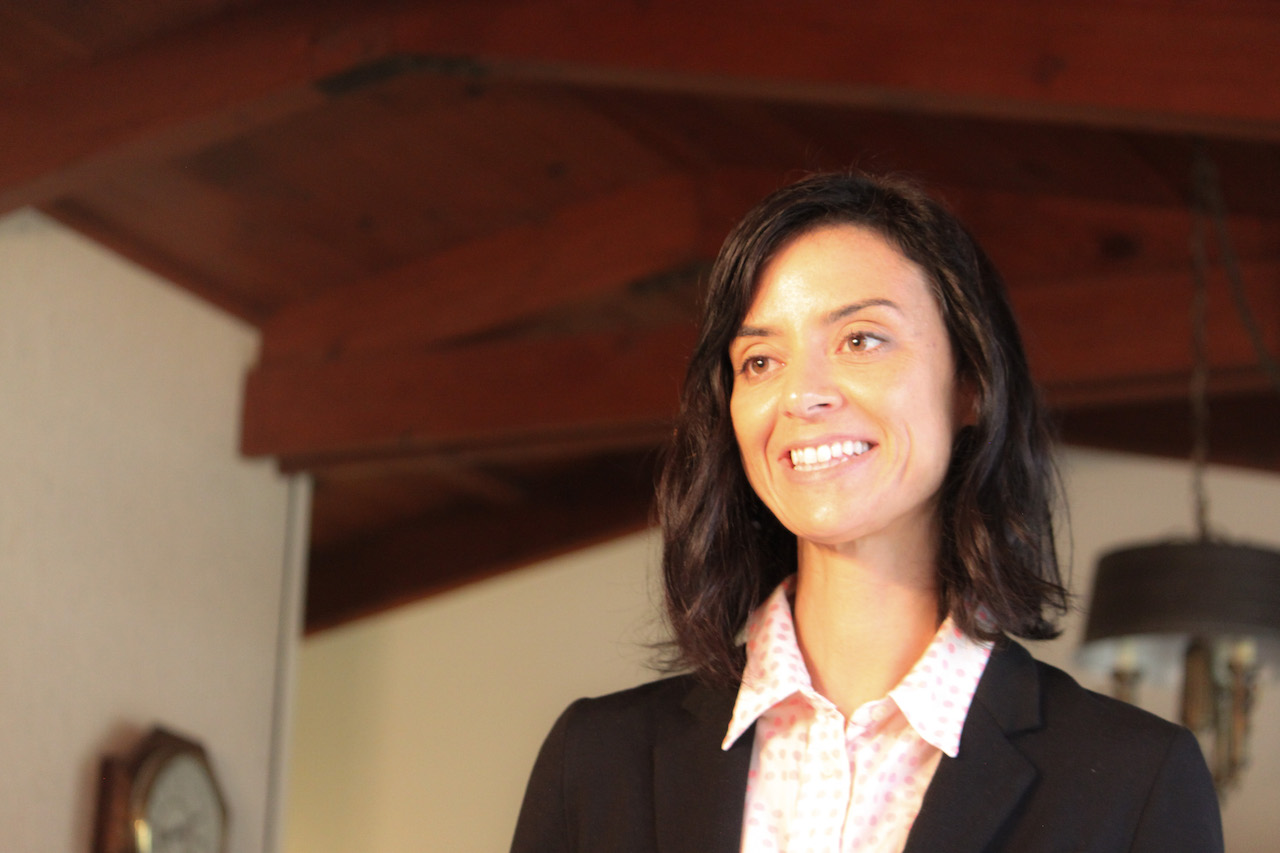 Kalindi Vora
Kalindi Vora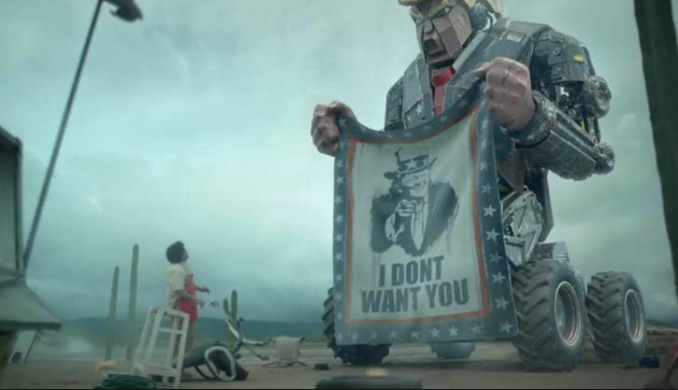 Through the theme of “Feminist Futures,” we will engage cutting-edge work on futurities,
which broadly imagines a future in which oppressed peoples have realized social justice
in order to work toward that vision in the contemporary moment. While various social
justice campaigns envision more just futures, including the civil rights movement,
the women’s liberation movement, and the LGBTIQ pride movement, among others, contemporary grassroots efforts toward social transformation emphasize
the need to radically re-engage the notion of futurity in order to create new anti-oppressive
frameworks. Many of our majors, minors and graduate students select Women’s Studies
in order to become activists for social change, and will be interested interlocutors
in this debate.
Through the theme of “Feminist Futures,” we will engage cutting-edge work on futurities,
which broadly imagines a future in which oppressed peoples have realized social justice
in order to work toward that vision in the contemporary moment. While various social
justice campaigns envision more just futures, including the civil rights movement,
the women’s liberation movement, and the LGBTIQ pride movement, among others, contemporary grassroots efforts toward social transformation emphasize
the need to radically re-engage the notion of futurity in order to create new anti-oppressive
frameworks. Many of our majors, minors and graduate students select Women’s Studies
in order to become activists for social change, and will be interested interlocutors
in this debate.
 Specifically, on March 7, 2019, we will convene a public lecture based on Neda Atanasoski
and Kalindi Vora's vanguard scholarship. Their book Surrogate Humanity: Race, Robots,
and the Politics of Technological Futures (forthcoming from Duke UP 2019) traces "the ways in which robots, artificial intelligence,
and other technologies serve as surrogates for human workers within a labor system
entrenched in racial capitalism and patriarchy. Analyzing myriad technologies, from
sex robots and military drones to sharing economy platforms, Atanasoski and Vora show
how liberal structures of antiblackness, settler colonialism, and patriarchy are fundamental
to human-machine interactions as well as the very definition of the human. While these
new technologies and engineering projects promise a revolutionary new future, they
replicate and reinforce racialized and gendered ideas about devalued work, exploitation,
dispossession, and capitalist accumulation. Yet, even as engineers design robots to
be more perfect versions of the human—more rational killers, more efficient workers,
and tireless companions—the potential exists to develop alternative modes of engineering
and technological development in ways that refuse the racial and colonial logics that
maintain social hierarchies and inequality" (https://www.dukeupress.edu/
Specifically, on March 7, 2019, we will convene a public lecture based on Neda Atanasoski
and Kalindi Vora's vanguard scholarship. Their book Surrogate Humanity: Race, Robots,
and the Politics of Technological Futures (forthcoming from Duke UP 2019) traces "the ways in which robots, artificial intelligence,
and other technologies serve as surrogates for human workers within a labor system
entrenched in racial capitalism and patriarchy. Analyzing myriad technologies, from
sex robots and military drones to sharing economy platforms, Atanasoski and Vora show
how liberal structures of antiblackness, settler colonialism, and patriarchy are fundamental
to human-machine interactions as well as the very definition of the human. While these
new technologies and engineering projects promise a revolutionary new future, they
replicate and reinforce racialized and gendered ideas about devalued work, exploitation,
dispossession, and capitalist accumulation. Yet, even as engineers design robots to
be more perfect versions of the human—more rational killers, more efficient workers,
and tireless companions—the potential exists to develop alternative modes of engineering
and technological development in ways that refuse the racial and colonial logics that
maintain social hierarchies and inequality" (https://www.dukeupress.edu/
Songs of Memory and Resistance: Gabriella Ghermandi's Italian-Ethiopian Storytelling (March 5, 2019)
Songs of Memory and Resistance: Gabriella Ghermandi's Italian-Ethiopian Storytelling.
Gabriella Ghermandi was born in Addis Ababa, Ethiopia, her mother's land, and lived there until the late 1970s when she was forced to relocate to Bologna, her father's hometown in Italy, where she still lives. She uses storytelling and live performance to reach diverse audiences and foster mutual empathy. She is also the creator and lead singer of The Atse Tewodros Project, an artistic collaboration between Ethiopian and Italian musicians.
Italian-Ethiopian author and performer Gabriella Ghermandi will discuss her multifaceted work as writer, singer and storyteller. She is the author of the acclaimed novel Queen of Flowers and Pearls, a marvelous voyage in time and space intertwining multiple stories of resistance from the age of Italian colonialism to contemporary migrations. Originally published in Italian in 2007, it was translated in English in 2015 and in Amharic in 2017.
Italian and Amharic
Date/Time: Tuesday, March 5, 11:00 a.m.
Venue: Conrad Prebys Aztec Student Union
Venue: Conrad Prebys Aztec Student Union
Faculty Sponsor:
Clarissa Clo, Department of Italian Studies, [email protected]
Event:
The work of William Shakespeare has been called “timeless” in part because it has stood the test of time. Some 400+ years later the work is still performed, studied, debated, loved and hated. Whatever one thinks of the work, there is no question of the value place on it in Western culture. It is taught in our public schools, in our colleges and universities and performed in theaters across the nation. American children, regardless of their cultural backgrounds, are expected to read it and understand it as important and valuable. Shakespeare is anticipated and required, but the majority of American students at all levels struggle to access the language, unlock the poetry, and make meaning of the stories.
This Common Experience Time proposal will support an interdisciplinary collaborative teaching and performance project that engages a deep-dive into Shakespeare’s Romeo and Juliet. This play, written over 400 years ago is arguably the most famous and most frequently referenced of Shakespeare’s cannon, it is, perhaps his most “timeless” of plays. Additionally, although it is intended to be performed within “the two hours’ traffic of our stage,” all of the action of this tragic tale, including the marriage and death of the ill-fated, star-crossed lovers happens in less than 4 days. The references to time in this text are numerous.
In Fall of 2018 Dr. Marva Cappello’s TE 640 Writing Instruction and Methods (15 students) will partner with Dani Bedau’s THEA 438 Touring Shakespeare (10 students). Students will study Romeo and Juliet, looking out of evidence of timelessness and taking note of the way time is used in the text. The MA Education students and Theatre performance students will be gaining access to literacy techniques aimed at unlocking the puzzle that is a Shakespeare text. They will participate in a process called Line Understanding, using Shakespeare Lexicons to create a line-by-line decoding of assigned text and then translating that into a personal paraphrase of the text. Additionally, Theatre students will be paired with Education students for participation in a unique, semester-long activity where they will be asked to communicate ideas and images via text messages using their smartphones. The resulting catalogue images, written content, and themes will inform both the final script to be used in the performance detailed below, as well as with an accompanying study guide.
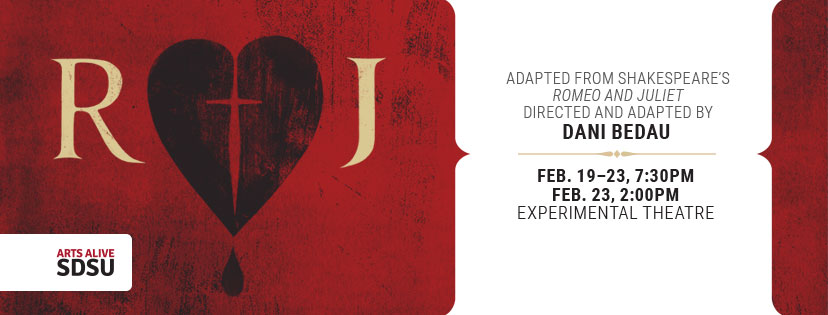
In Spring of 2019 a performance piece titled R+J: a 45 minute theatrical collage based on Shakespeare’s Romeo and Juliet will perform for a week as part of the School of Theatre, Television, and Film’s
season of plays and will tour to surrounding area high schools. It will also perform
as part of the Downtown Gallery’s Spring 2019 exhibition that will share the Experience
Time focus.
Location: SDSU Experimental Theatre
Date: Various
Time: Various
Faculty Sponsors:
Dani Bedau, School of Theatre, Television, and Film, [email protected]
Marva Cappello, School of Teacher Education, [email protected]
The history department proposes to help students think about experiencing time by adding community and remote-site learning components to our lower-division world history courses. The main goal is to add new dimensions of thinking about the past (art and artefacts in museums; interviews on campus and in the community) to the written texts and visual sources used within the classroom and in the assigned course readings. Students will be asked to reflect on continuity and change over time and how people access the past. Students will compare and contrast the different senses they get of the past by looking at cultural artefacts in a museum, talking to members of the community in question, and studying the materials available in their courses.
Location: TBA
Date: TBA
Time: TBA
Faculty Sponsor:
Ed Beasley, Department of History, [email protected]
The Glaspell Project performance and post-performance panel discussion on experiencing
time in theatrical performance with the play’s director, Professor Randolph Reinholz, and members of the cast.
Date/Time: Sunday, September 30, 2 p.m.
Venue: Experimental Theatre, SDSU
Faculty Sponsor:
Eve Kornfeld, Department of History, [email protected]
Event:
Location: Love Library, LL-108
Date: Thursday, October 18, 2018
Time: 3:00PM
Faculty Sponsor:
Amanda Lanthorne, Special Collections & University Archives, [email protected]
Summary:
The Library’s upcoming exhibit will focus on postmodern and experimental American literature. The exhibit will run from fall 2018 through June 2019 and feature materials from the Larry McCaffery Papers, held in Special Collections and University Archives. McCaffery is a professor emeritus of English at San Diego State University (SDSU) and a notable postmodern and contemporary American literary critic. His collection includes interviews with influential and innovative writers such as Raymond Federman, Mark Danielewski, Joanna Russ, Ursula LeGuin, Samuel Delany, David Foster Wallace, and more. Interview manuscripts and correspondence in the collection provide insight into these writers’ writing processes and influences, and document McCaffery's unique interview process.
As part of the exhibit programming, Tom LeClair, a respected and influential critic of contemporary American fiction, will speak about the importance of McCaffery’s archive and how it documents and preserves literary conversations. LeClair will explore the relationship between literature, orature and Time. In literature, the writer is free to make revisions and changes, and the reader is free to control the pace at which they read, the amount they read, and when they read. In contrast, orature has no revisions. It is momentary and fleeting, forcing the listener to be present.
Speaker bio:
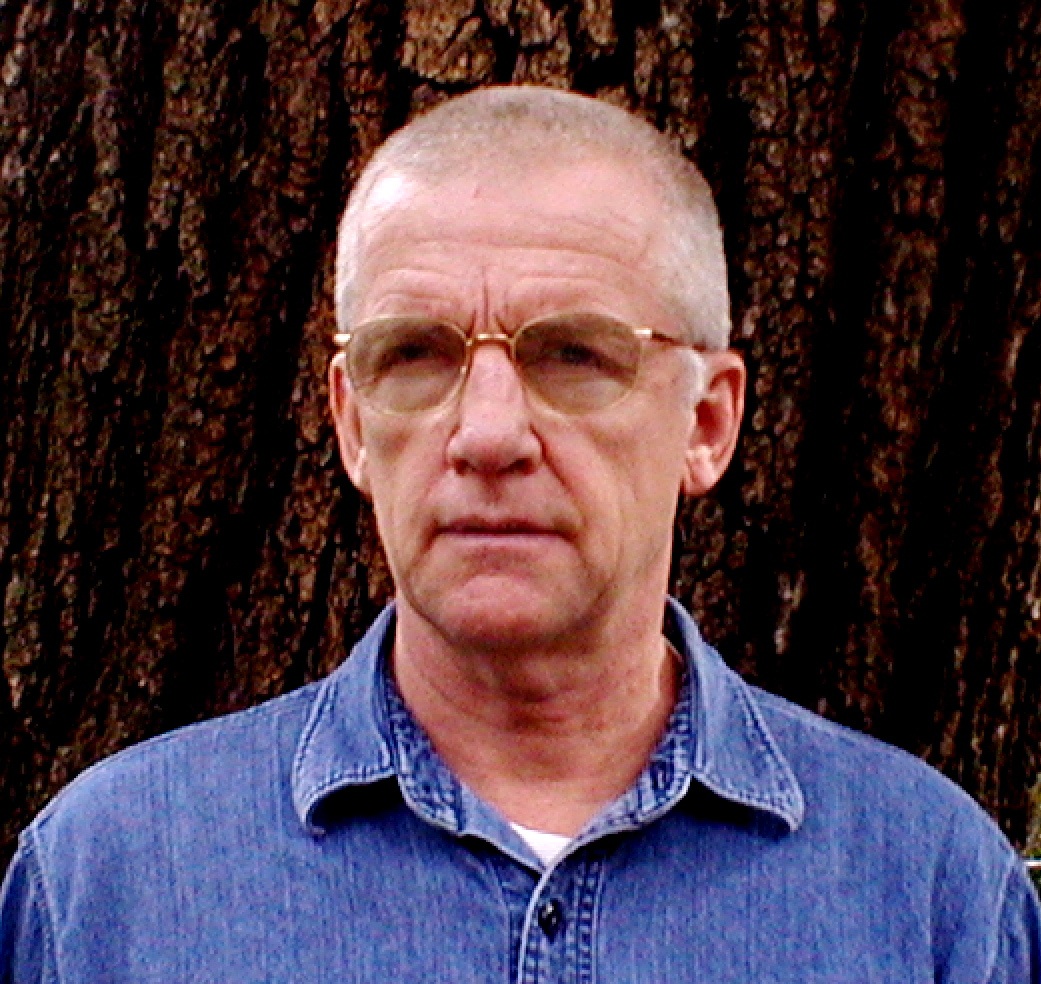 Tom LeClair is a professor emeritus of English at the University of Cincinnati, now living in
Brooklyn. He is the author of seven novels, three works of literary criticism, Harpooning Donald Trump (political essays), and hundreds of essays and reviews over 40 years in nationally
circulated periodicals. He is also the co-editor of a book of literary interviews, Anything Can Happen, with Larry McCaffery.
Tom LeClair is a professor emeritus of English at the University of Cincinnati, now living in
Brooklyn. He is the author of seven novels, three works of literary criticism, Harpooning Donald Trump (political essays), and hundreds of essays and reviews over 40 years in nationally
circulated periodicals. He is also the co-editor of a book of literary interviews, Anything Can Happen, with Larry McCaffery.
Faculty bio:
Amanda Lanthorne is the University Archivist. She works to preserve, organize and provide access to archival collections related to university history as well as local and regional history. She is particularly interested in documenting underrepresented groups in an effort to foster inclusivity and promote empathy, sensitivity, and critical thinking. She has an MA in Middle Eastern Studies from Columbia University and an MLIS from San Jose State University.
Event:
Location: TBA
Date: Friday, Novemner 9, 2018
Time: 10:00-11:00 A.M.
Maya Chinchilla, author of The Cha Cha Files: A Chapina Poética (2014), is a Guatemalan poet and Lecturer at UC Davis in Chicana/Latino/a/x Studies. She is the editor of the forthcoming “CentroMariconadas A Central American Queer and Trans Anthology”. Maya received her MFA in English and Creative Writing from Mills College, a BA in Latin American and Latino Studies at UC Santa Cruz, and studied Broadcasting and Communications at SFSU. She is currently working on an installation at SOMARTS about her experience with healing, disability and learning to walk again.
Maya writes and performs poetry that explores themes of historical memory, heartbreak, tenderness, sexuality, and alternative futures. Her work —sassy, witty, performative, and self-aware— draws on a tradition of truth-telling and poking fun at the wounds we carry.
Sponsors:
SDSU Common Experience, The Department of Chicana and Chicano Studies, the Master of Arts in Liberal Arts and Sciences, the Women’s Resource Center, and the Department of Women’s Studies.
Faculty Sponsor:
Victoria González-Rivera, Chicana and Chicano Studies, [email protected]
Event:
Location: Scripps Cottage
Date: Friday, Novemner 9, 2018
Time: 12:00-4:00 P.M.
Speakers in order of appearance:
1. Trans and LGBTTI Migration from Honduras By Suyapa Portillo Villeda, Ph.D. Associate Professor, Pitzer College. Frequent contributor to the North American Congress on Latin America (NACLA) Report on the Americas, the Huffington Post, and other media, and author of academic articles on Honduras in multiple journals and books.
2. From Obama to Trump: Constructing a Central American “Refugee Crisis” By Leisy Abrego, Ph.D. Associate Professor, UCLA. Author of the award-winning book, Sacrificing Families: Navigating Laws, Labor, and Love Across Borders (Stanford University Press, 2014)
3. Minor Offenses: Children, Violence, and Refugee Migration By Ester Hernández, Ph.D. Professor, Cal State Los Angeles. Co-editor of the award-winning book, U.S. Central Americans. Reconstructing Memories, Struggles, and Communities of Resistance (The University of Arizona Press, 2017).
4. The Role of "Race" and "Racial Scripts" in Understanding U.S. Response to Central American Migrants By Arely Zimmerman, Ph.D. Assistant Professor, Pomona College. Co-author of By Any Media Necessary: the New Youth Activism (NYU Press, 2016).
5. Contemporary Human Rights Abuses in Nicaragua and in U.S. Asylum Policies By Victoria González-Rivera, Ph.D. Associate Professor, SDSU. Author of Before the Revolution. Women’s Rights and Right-Wing Politics in Nicaragua, 1821-1979 (Penn State University Press, 2011).
6. Not your Tragic Other: Central American Solidarity, Identity, and Poetics By Maya Chinchilla, MFA. Poet and Lecturer at UC Davis. Author of The Cha Cha files. A Chapina Poética(Korima Press, 2014). Editor of the forthcoming CentroMariconadas: A Central American Queer and Trans Anthology.
7. The Legacies of Genocide: (Re) Framing Maya Migration to the United States ByAlicia Ivonne Estrada, Ph.D. Professor, CSU Northridge. Co-editor of the award-winning U.S. Central Americans. Reconstructing Memories, Struggles, and Communities of Resistance (The University of Arizona Press, 2017).
Sponsors:
SDSU Common Experience, the Department of Chicana and Chicano Studies, the College of Arts and Letters Dean’s Office, the Department of Women’s Studies, the Department of History, the Department of Political Science, the Department of Sociology, the Master of Arts in Liberal Arts & Sciences, the Women’s Resource Center, and the Center for Latin American Studies.
Faculty Sponsor:
Victoria González-Rivera, Chicana and Chicano Studies, [email protected]
Art Exhibition
I Love to Ride My Bicycle
November 15, 2018 through January 27, 2019
SDSU Downtown Gallery
725 West Broadway
San Diego, CA 92101
art.sdsu.edu • 619-501-6370
Faculty Sponsor
Tina Yapelli, Professor, School of Art + Design, [email protected]
Description
Since their invention in 1817, bicycles have affected the progress of society in terms of both culture and modern industry. As a result of this broad impact, bikes have influenced artists over the past two centuries, with luminaries such as Marcel Duchamp and Pablo Picasso featuring a bicycle parts in ground-breaking sculptures. Today, bicycles inspire a spectrum of international artists. I Love to Ride My Bicycle presents work by contemporary practitioners from Argentina, Australia, Canada, France, the United States, and Vietnam who incorporate bikes as muse and material. Ranging from drawing, painting, and photography to sculpture, performance, and video installation, their artworks manifest the ongoing significance of two-wheeled human-powered vehicles. At the same time, the works convey the widespread enthusiasm for bicycles expressed by the title of the exhibition.
I Love to Ride My Bicycle is curated by Professor and Senior Curator Tina Yapelli and organized by the SDSU Downtown Gallery. The exhibition and events are sponsored by the SDSU Common Experience, the School of Art + Design, the College of Professional Studies and Fine Arts, and Arts Alive SDSU. Additional support is provided by the San Diego State University Art Council Ambassadors. Community partners are the San Diego County Bicycle Coalition and the San Diego Mountain Biking Association.
Artists
Kim Adams
Christopher Brown
Lana Z. Caplan
Roman de Salvo
Shaun Gladwell
Katina Huston
Dinh Q. Lê
Leonardo Gilles Fleur
Kristen Morgin
Kori Newkirk
Peter Scheidt
Jason Sherry
Events
Thursday, November 15
5:00 to 8:00 PM
Reception with the Artists
Performance by Peter Scheidt
SDSU Downtown Gallery
Tuesday, November 20
5:30 PM
Lecture by Peter Scheidt
Student Services West, Room 1500
San Diego State University
Thursday, December 20 and January 17
5:00 to 8:00 PM
Downtown at Sundown
SDSU Downtown Gallery
Saturday, January 12
8:00 AM
We Love to Ride Our Bicycles
Free community ride organized by the San Diego County Bicycle Coalition
SDSU Downtown Gallery
The exhibition and events are free and open to the public.
Gallery Hours
11:00 a.m. to 4:00 p.m.
Closed Tuesday and Wednesday
Closed November 22 and 23, December 24 and 27, January 21
Image Captions
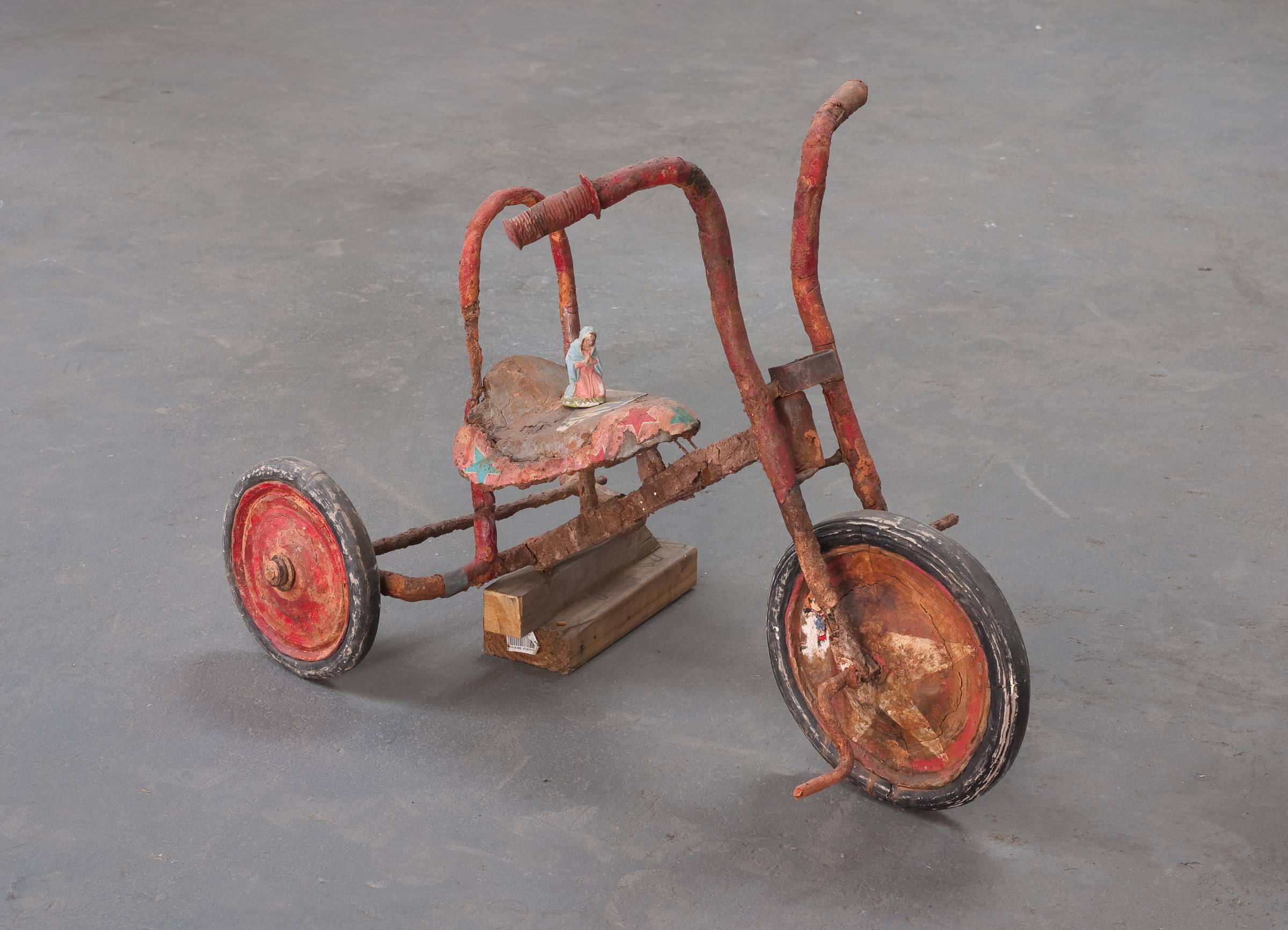 Christopher Brown, Twice Over, 2017; oil on linen, 80 x 110 inches (diptych); image courtesy the artist and Berggruen
Gallery, San Francisco; photo by Lee Fatheree
Christopher Brown, Twice Over, 2017; oil on linen, 80 x 110 inches (diptych); image courtesy the artist and Berggruen
Gallery, San Francisco; photo by Lee Fatheree
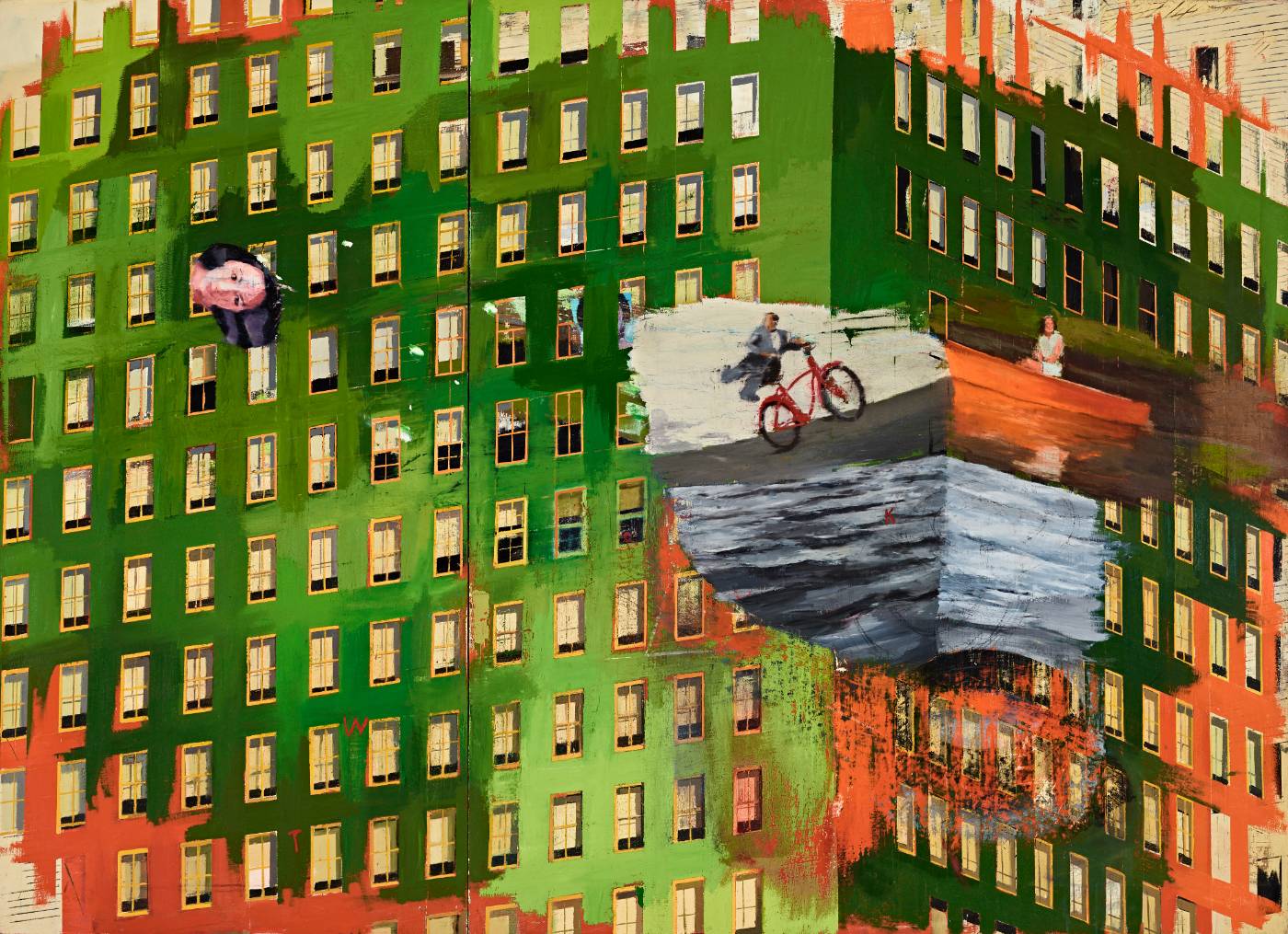 Kristen Morgin, Madonna with Tricycle, 2013; unfired clay, paint, ink, wood, wire; 20 x 16 x 18 inches; image courtesy of the artist and Marc Selwyn Fine Art, Beverly Hills
Kristen Morgin, Madonna with Tricycle, 2013; unfired clay, paint, ink, wood, wire; 20 x 16 x 18 inches; image courtesy of the artist and Marc Selwyn Fine Art, Beverly Hills
Event:
Public lecture on "Why Learn History (When It's Already on Your Phone)" by Sam Wineburg.
Reception to follow
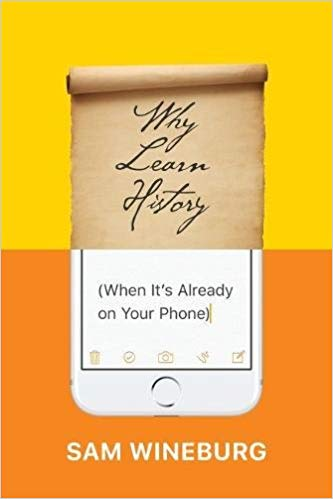
Location: Don Powell Theatre
Date: Thursday, November 15, 2018
Time: 4:00PM
Faculty Sponsor:
Eve Kornfeld, Department of History, [email protected]
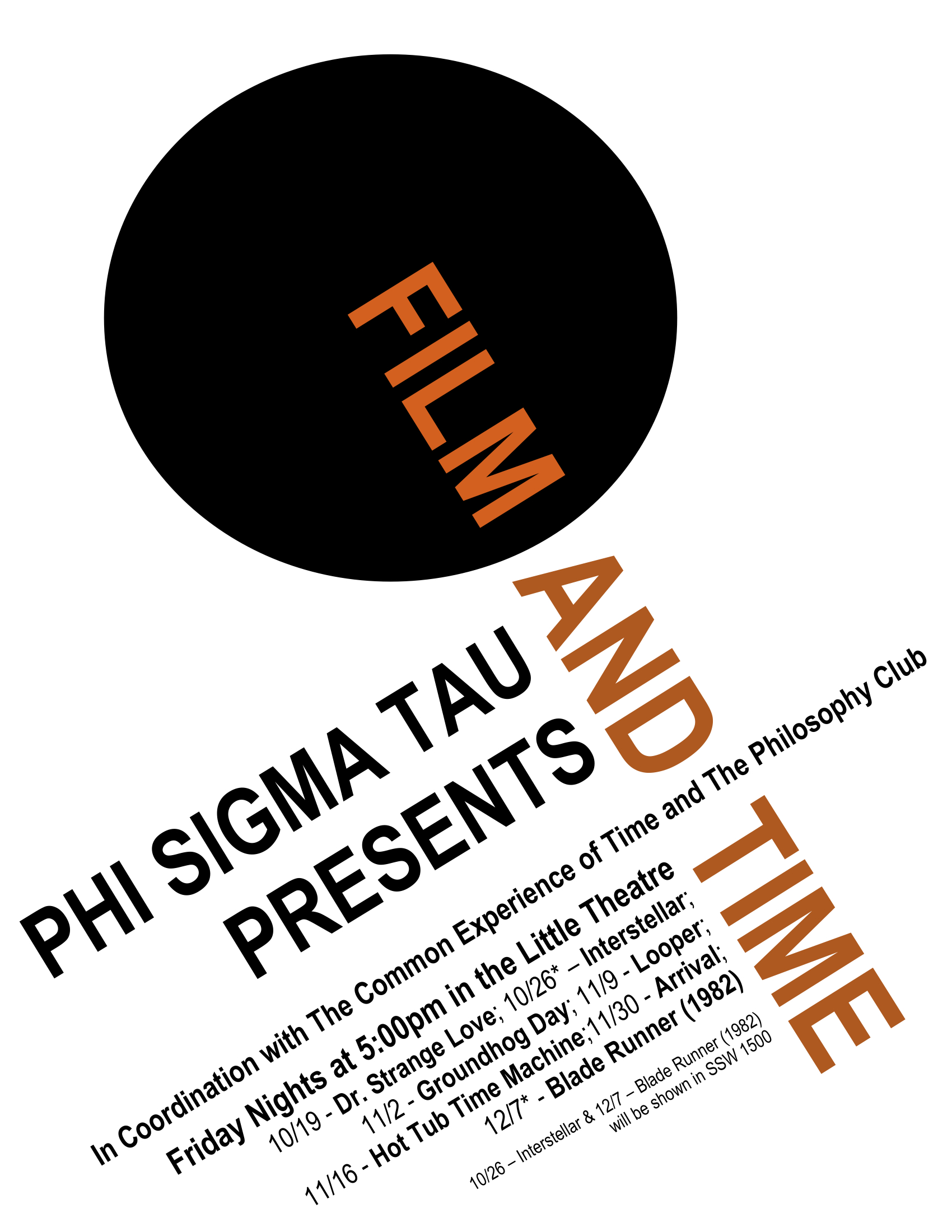 Exhibition Dates:
Exhibition Dates:
October 19 - December 7
Friday Nights at 5:00PM
Little Theatre
San Diego State University
Sponsors:
Mark Wheeler, Philosophy, [email protected]
Phi Sigma Tau Honours Society
Events:
10/19 - Dr. Strange Love
10/26* - Interstellar
11/2 - Groundhog Day
11/9 - Looper
11/17 - Hot Tub Time Machine
11/30 - Arrival
12/7* - Blade Runner (1982)
* 10/26 - Interstellar & 12/7 - Blade Runner (1982) will be shown in SSW 1500